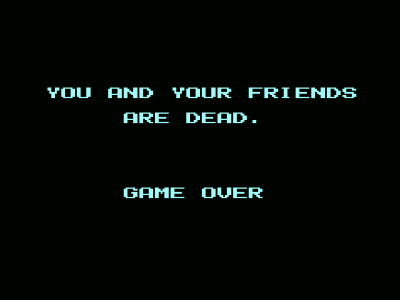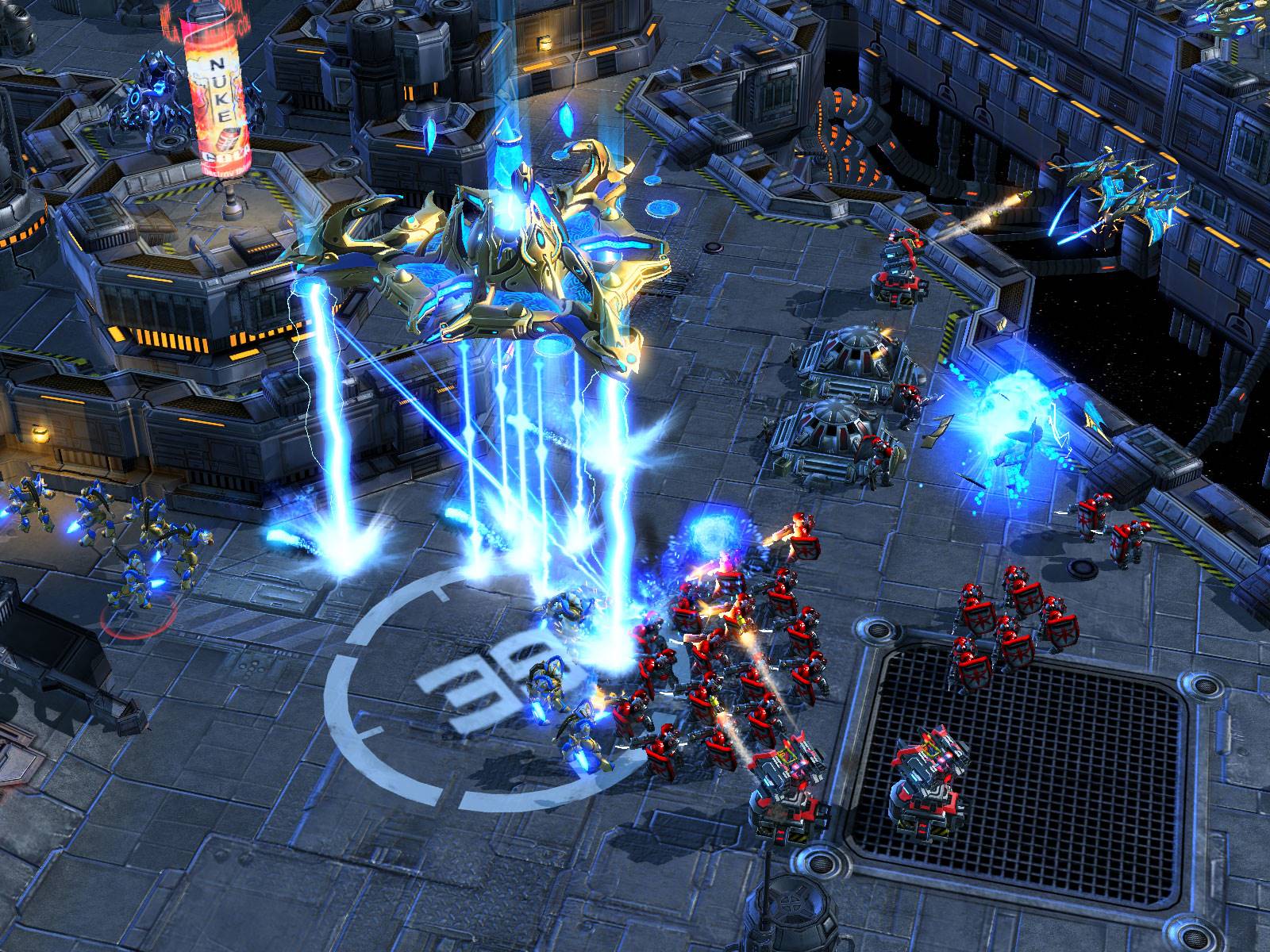
Since the dawn of time, game players could be categorized as one of two things — winners or losers. If you perform well, you win a game. If you don’t, you lose. It’s as simple as that. Lately, however, we’ve seen a paradigm shift; now we are seeing games you can’t lose. Or, more accurately, games that don’t have any clear, defined "losing" state. We’re used to the tried-and-true "game over" screen, but what if you can’t get a game over? Would it still be a game?
I’d argue that a game, by definition, requires a goal. A goal, however, intrinsically creates a sense of failure when one falls short of it. All games create a sense of satisfaction and frustration based on how close you come to achieving said goals, and thus, all games can be lost. So do we really need game designers to dictate this to us?
It’s the Rapture…

One of the first games to utilize this concept of not being able to "lose" was Bioshock. When you’d run out of health, death would not come for you. Instead, you’d be resurrected a few rooms away at the nearest "vita-chamber" with a smattering of health restored and be set on your merry way to continue the fight. This simple, intuitive device created a lot of controversy in the gaming world. Cynics cried that it defeated all semblance of challenge from the game. That you could play through the entirety of the game on the hardest difficulty setting, using nothing but a wrench, and still be able to complete the game.
However, I’d argue that that would be missing the point entirely. You don’t want to die in Bioshock because dying, quite simply, isn’t fun. Maybe it’s because you’ll have to backtrack an extra 10 seconds to get to where you were. A minor inconvenience, but an inconvenience nonetheless. Maybe it’s because you’ve created an arbitrary goal for yourself, say to kill a Big Daddy without dying. Or maybe it’s because dying makes you feel bad about yourself. You’d be letting yourself down knowing you just aren’t good enough to get past a specific part. Any way you slice it, there is a way to lose in Bioshock. Just none prescribed by the game designers.
My favorite thing about this is that it keeps you in the game at all times. You’ll never have to face a load screen, for example. In most games, when you die and reload, you’ll have to keep repeating that same preordained sequences for the umpteenth time. You’ll remember that this one enemy pops out from behind that barrel on the left end of the hall, then this other enemy will come charging from the right. You’ll repeat the same actions ad infinitum until you get to the part that’s troubling you. In Bioshock, even after dying, you’ll stay in the game and every single moment will be a new experience. In this regard, not being able to die creates less of a Groundhog’s Day-like experience than being able to die and repeat the same steps again and again.
There are drawbacks to this, however. Namely that you cannot retry a challenge that you’ve failed. Actually, you can, by manually saving and reloading. But let’s be honest, that’s a bit of a pain in the ass. I do feel like the game could give you a few more options for how severe the punishment for dying should be. I would suggest making it so on Hard mode enemies would regenerate some, if not all, of their health upon your demise. That way you could get another stab at your challenge while still keeping things fresh. By making it optional, it wouldn’t alienate beginners who may lack the manual dexterity for this sort of thing, yet still provide a challenge for the "hardcore" gamer.
A Fate Worse Than Death…
A more recent game to follow suit is Fable 2. In Fable 2, you cannot get a game over, and the only punishment for dying is that you a) don’t get any experience points from the battle up to that point, and b) your character will have a permanent scar to mark their shame. Now you’ll not only be failing your own personal goals, but face humiliation if you’re to let anyone else see your character. In essence, Peter Molyneaux has created a more tangible way in which you can lose the game, just not in any way that will impede your progress.
The downside to this is much as it was in Bioshock — there’s no option to recreate your challenge. Perhaps giving you the choice at death as to whether you’d like to a) accept the scar, forfeit the exp, and continue, or b) restart the battle would have helped. But honestly, if given the choice, who’s going to pick A, unless they’re really, truly stuck? I have an inkling that not many would, making it the more severe punishment for most gamers. Experience can be gained elsewhere, and the scar can maybe look cool, but robbing yourself of the challenge is the true punishment. The game is never mad at you, just disappointed.
A Princely Alternative…
Another recent example of this phenomenon is the new Prince of Persia. The Prince cannot die, ever. Unlike the previous games mentioned, while PoP keeps you "in the game," it really only does it to mask load times and make for generous checkpointing. You’ll merely be brought back to where you were moments before death. Rather than make every single moment new, it settles for keeping the replaying of sequences down to a minimum.
The exception to this in the game’s combat, where the only punishment for death is an increase in the enemy’s health. Much like Bioshock, I feel like the option of a hard mode to increase the enemy’s regained health would have been a welcomed addition. Had the enemies regained full health, it basically would be reloading from the beginning of the fight, sans the actual loading, making for a good compromise of old and new approaches to death.
I believe that same concept could extend to more "hardcore" games like Ninja Gaiden, as well. Why make you sit through a load screen and retrace your steps when you could stay in the fight and have the enemies regain full health? Of course, if that were the case, the odds would be in the enemies favor as all health potions you would have used would have been for naught. If they could replenish your equipment to what it was when you entered the battle and refill all the enemies’ health, that would make for a good way of reducing repetition, while still keeping the challenge intact.
Memento Mori…
Other genres could benefit from this change too. Most JRPGs, for example, such as the Shin Megami Tensei series and Final Fantasy, are known for making you reload way back to the last save point, making you lose what could easily be a half-hour plus of progress. Why can’t they extract you from the battle, give you no exp for the battle that you failed at, then give the main character 10% of his/her health back? The party wouldn’t be able to get very far off that. Certainly they’d be in no shape to take on a boss. It would keep level grinding, a common bugbear of the genre, down to a minimum. Several games have allowed you to keep whatever exp you had prior to death (Viewtiful Joe and Devil May Cry come to mind), that it’s surprising most games in a genre notorious for padding haven’t caught on to the fact that there are other ways to punish the player than removing long periods of progress.
When There’s No More Room in Hell…
Survival-horror games are known for being scary because supplies and save points are often scarce. Though that’s a cheap tactic to make things scary. That last hammer brother in the original Mario Bros is scary because one wrong move and you’ll have to redo the entire game. We have the technology and artistry in games that they need not rely on these sorts of cheap tricks anymore. The aforementioned Bioshock was a perfect example of this. It was scary because of the sound, music, environments, enemy design, and AI. You knew you could always regain consciousness with no loss to your progress, but even that wouldn’’t make you feel comfortable in the subterrainian bowels of Rapture.
One could argue that just because a game can be scary without resorting to sadistic checkpointing, doesn’t mean that a lack of save points wouldn’t make it even scarier. It’s a valid argument, and one that isn’t likely to end anytime soon. If the idea is that you’re supposed to relate to a character who is horrified that they could die, the closest way to relay this feeling to the player is to create as severe a punishment as possible, which may include losing vast amounts of progress. It would depend on if the designers were focusing more on narrative and would like even the least skilled players be able to see it to the end, or if the game were focused more on simply scarring the living daylights out of you. If anyone could think of a better way of combining the two, I’d like to hear it.
The Classics Are There for a Reason…

This concept of removing game overs completely is not viable for all types of games. Strategy games, for example, are built around the idea of trial and error; recreating a challenge until you find the most effective solution to it. The crux of many co-op games like Gears of War is that you have to revive one another to move on. If both of you could die and could still continue, even with enemies receiving a health boost, it would remove much of the strategy element of setting up your attack, or falling back to a defensive position as the enemies launch their attack. Occasionally, setting you back to a set time and place is a necessary evil. Sometimes, you need to move backward in order to move forward.
We’ve Tried the Stick…
Through humiliation, frustration, or regret at the loss of an experience (or in same cases just "exp"), game designers have been showing us there are all new ways we can lose at things beyond the bog-standard "game over." We gamers are truly a masochistic bunch, and I for one feel it’s time game designers start coming up with more unique, satisfying ways of torturing us. There is a time and a place for a conventional game over — ensuring mastery becomes a required prerequisite to continue. There are, however, other ways of dangling that carrot in front of us, coaxing us to improve, without subjecting us to whatever the designer’s idea of losing is. For man is his own worst enemy, and we don’t always need a game over screen to tell us when we’ve lost.
”